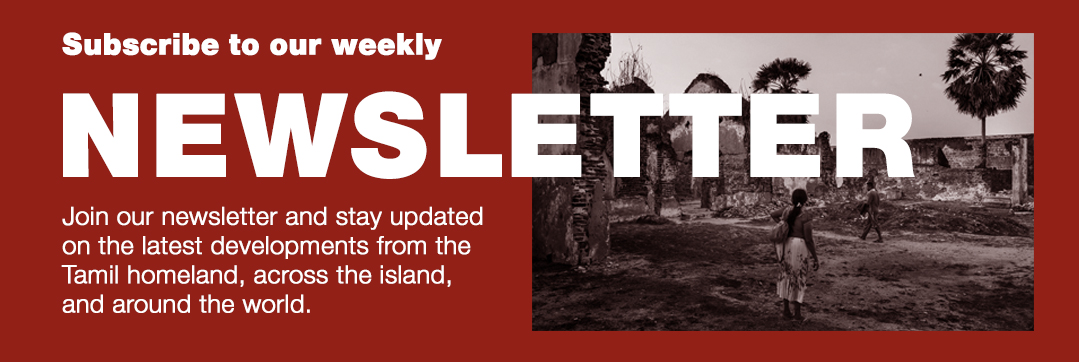.jpg)
On 15th September 1987, Lt. Col. Thileepan, a political wing leader with the Liberation Tigers of Tamil Eelam (LTTE), began his hunger strike, demanding that the Indian government honour the pledges it made to the Tamil people.
His fast lasted 11 days, during which he was surrounded by over 100,000 supporters. On 26th September 1987, he died. Despite 33 years passing, the original demands he made are still pertinent to issues facing the Eelam Tamil nation. The pledges centered on releasing Tamils detained under the Prevention of Terrorism Act; ending the Sinhala colonisation of the North-East; and bringing an end to the military occupation of the Tamil homeland.
Since the end of the armed conflict, we have not seen progression on these issues but rather a deeper entrenchment of Sri Lanka’s military in the North-East; continued use of the internationally condemned Prevention of Terrorism Act to silence government critics; and expedited colonisation schemes, as well as state-led land grabs.
Last week, Sri Lanka’s State Minister Sarath Weerasekara told parliament that military-occupied land in the North-East will “never” be given back to the people, blaming Tamil politicians with “separatist agendas” as the reason for continued military control of these areas.
Beyond economic theft, the military’s role in the North-East is to eliminate dissent and erase the memories of resistance to state oppression. In the UN Special Rapporteur’s report, he notes; “surveillance, intimidation and arrests continue to hamper memorialization activities”.
“Grieving families have expressed the need to bury or destroy photographs of their deceased loved ones in uniform for fear of harassment by the security forces”, he further adds. His report goes on to state that “trauma and tensions have been exacerbated by official denials of the suffering experienced by Tamil civilians during the civil war”.
The government’s denial of the pain inflicted upon Tamils was further displayed this week as Sri Lanka attacked the UN over reports which indicated that senior military officials oversaw crimes against humanity. This follows further documentation from the global body which has revealed that Sri Lanka continues to have the second-highest number of enforced disappearances in the world - second only to Iraq.
The United Nations Working Group on Enforced or Involuntary Disappearances also warned of a “deteriorating civil society space in Sri Lanka,” as human rights defenders have come under increasing state pressure since the election of accused war criminal Gotabaya Rajapaksa as president last year.
Rajapaksa was elected on a strong nationalist mandate which pledged not only to avoid prosecutions of Sri Lankan “war heroes” who have been accused of heinous war crimes; and to undo concessions made by the previous administration towards accountability. For Sri Lanka there is no alternative narrative other than the victorious triumph of the Sinhalese over the ‘terrorist’ Tamils.
This repression of memory is reflected in monuments that have been built and destroyed in the Tamil homeland. In 1988, a year after the death of Thileepan, a memorial was erected in Nallur Kandwaswamy Temple to remember his sacrifice. It was a pale blue tower stretched into the sky holding his portrait surrounded by red and yellow flags. The memorial was destroyed by the Sri Lankan army after their capture of Jaffna in 1996. It was rebuilt in 2003 during the ceasefire period and destroyed again by the army in 2006. In 2007, it was razed by a group of armed men, and once again in 2010, leaving nothing behind.
This year, Sri Lankan police have already begun their crackdown on organisers, arresting a Tamil politician in Jaffna and summoning TNPF activists in Batticaloa. Despite this continued, oppression Tamils persist in their defiance and their willingness to cling on to the memories of the nation’s loved ones.
In September 1987, before losing his voice, Thileepan is remembered to have last said:
“I am confident that our people will, one day, achieve their freedom. It gives me great satisfaction and contentment that I am fulfilling a national responsibility to the nation.”
33 years later, amidst the grip of Sinhala oppression, Thileepan’s indomitable spirit lives on.
Viruben Nandakumar, Staff Writer
_____
For more regular updates, sign up to our newsletter below.
____

